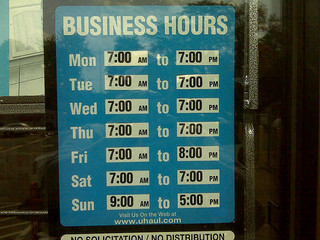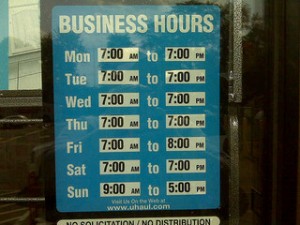 Whenever I talk about task lists, whether in a presentation or with clients, I hear about how they’ve tried making lists, but it just doesn’t work for them. And if they had a system for keeping track of their goals and tasks that was working for them, then I’d leave it alone. However, they usually don’t.
Whenever I talk about task lists, whether in a presentation or with clients, I hear about how they’ve tried making lists, but it just doesn’t work for them. And if they had a system for keeping track of their goals and tasks that was working for them, then I’d leave it alone. However, they usually don’t.
When I ask why task lists don’t work, I generally hear something like:
- It’s overwhelming to see everything I need to do in one place.
- I make a list, stare at it and then go and do something else entirely.
This isn’t a problem of task lists not working – the problem is what’s on the list.
Here are the top three reasons your list isn’t working for you:
- The tasks are too big.
Your tasks are things like updating your website, launching a program/product or paint the living room. Of course you’re frustrated and overwhelmed! Those are projects, NOT tasks (and you’ve created yourself a list of them!).Your task list is exactly that, a list of tasks. Instead of writing “paint the living room,” ask yourself what’s the next step? Have you picked a color yet? Maybe your next step is to look at colors at a store and grab a few examples to take home and review.
- The list is too long.
Everyone has created lists like this. You’ve decided to write down everything that you need to do and before you know it; you’ve assigned yourself 20 tasks for the day. Again, you’re frustrated because you know that there is no possible way to complete all those items today.And you’re absolutely right. It won’t all get done. You’ve actually created a list of things to do over the next three or four days. Recognizing that and deciding what to complete today from that list will save you time and frustration. So, create a smaller list just for today. If everything feels like it HAS to be done today, take a look at last week’s article here.
- The important tasks are hiding between the trivial tasks.
That looks like this: Clean off desk; Call Mom back; Email Jane; Write proposal for upcoming project; Make my inbox zero; Do the dishes; Wash towels.So, the really important thing, writing a proposal (or whatever it is for your business) is nicely hidden in the middle. You do all the “easy” tasks and run out of time at the end of the day for the really important one. Sorry, but that is not your task list not working for you – that’s you not working your task list.
Always prioritize your list. Even if it’s not written with the most important item first, put a star or asterisk or something next to the highest priority item so it gets done first!Think of it like this – if someone says I want you to call your mom back, do the dishes, read all your email, take this $1000 bill and clean off your desk – what would you do first? Yep, you’re going to take that $1000 right away and then go do those other things.
So, where is that $1000 on your task list? Find it and take care of that first.
What did I forget? What are your reasons for not keeping a task list? Share in the comments below.





